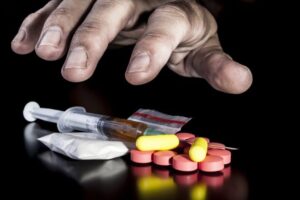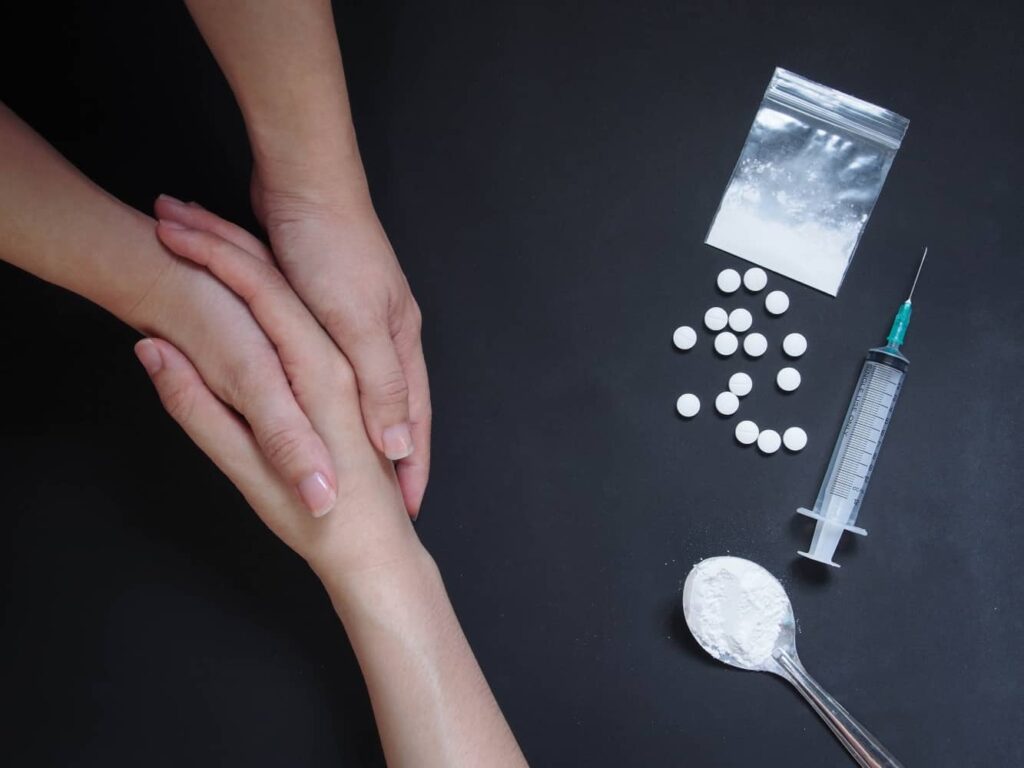Substance misuse affects not only the individuals struggling with addiction but also their families and loved ones. Witnessing someone you care about lose themselves to substances can be heart-wrenching and often leaves family members feeling helpless, scared, and confused. This blog aims to shed light on the complexities of substance misuse, offering guidance and support to those who find themselves on this difficult journey. From recognizing the signs to finding the right support, we’ll explore how to maintain hope and resilience during these trying times.
Contents
What Is Meant By Substance Misuse?
 Substance misuse refers to the harmful or hazardous use of psychoactive substances, including alcohol and illicit drugs. This type of use typically deviates from societal, medical, or legal guidelines, potentially leading to adverse health, social, and legal consequences. Substance misuse can range from the excessive consumption of alcohol to the non-medical use of prescription drugs and the use of illegal substances.
Substance misuse refers to the harmful or hazardous use of psychoactive substances, including alcohol and illicit drugs. This type of use typically deviates from societal, medical, or legal guidelines, potentially leading to adverse health, social, and legal consequences. Substance misuse can range from the excessive consumption of alcohol to the non-medical use of prescription drugs and the use of illegal substances.
It becomes particularly concerning when it leads to dependency. This is a condition characterized by compulsive drug-seeking behaviors and a loss of control over drug use. Addressing substance misuse often requires a comprehensive approach, involving medical intervention, psychological support, and more.
What Is The Difference Between Substance Misuse And Substance Use?
The terms “substance use” and “substance misuse” are related but distinct. And, each representing different aspects of drug and alcohol consumption.
Substance Use generally refers to the act of consuming any psychoactive substances. This can include alcohol, prescription medications, and illegal drugs. This term does not inherently imply that the use is problematic or harmful. In many contexts, substance use can be moderate, controlled, or otherwise within social and medical norms.
Substance Misuse, on the other hand, indicates a pattern of use that is harmful or hazardous. This involves using substances in ways not intended by a prescribing doctor, or in amounts that exceed recommended levels. It can lead to health problems, disability, and a higher risk of accidents or social consequences. It often implies an inappropriate or unhealthy use of substances that could potentially lead to addiction.
Understanding the difference between these terms helps in addressing the appropriate levels of intervention and support needed. While substance use does not automatically require intervention, substance misuse typically calls for some form of treatment or changes in behavior to prevent more severe outcomes.
What Are The Consequences Of Substance Misuse?
 Substance misuse can lead to a wide range of serious consequences affecting nearly every aspect of an individual’s life. These impacts can be categorized into physical health, mental health, social, and legal consequences:
Substance misuse can lead to a wide range of serious consequences affecting nearly every aspect of an individual’s life. These impacts can be categorized into physical health, mental health, social, and legal consequences:
Physical Health
- Addiction and Dependence: Regular use of substances can lead to physical dependence, where the body requires the substance to function normally, and psychological dependence, where a person feels unable to cope without the drug. This can lead to severe withdrawal symptoms when not using the drug, reinforcing the cycle of addiction.
- Chronic Health Issues: Different substances impact the body in various ways. For instance, alcohol can cause liver cirrhosis and pancreatitis, tobacco leads to lung cancer and heart disease, and opioids can cause nausea, constipation, and, over time, severe respiratory problems. Chronic misuse can be debilitating or even life-threatening.
- Acute Dangers: Overdose is a critical risk and is often fatal. Substances such as opioids can suppress breathing to a fatal level. Alcohol poisoning can suppress the central nervous system, leading to coma or death.
Mental Health
- Psychological Disorders: There is a strong link between substance misuse and mental health disorders. Substances can alter brain chemistry and exacerbate symptoms of mental disorders. Furthermore, individuals with mental health issues may turn to substances as a form of self-medication. And, creating a vicious cycle that worsens both conditions.
- Cognitive Impairments: Prolonged substance misuse can impair brain function, affecting cognitive abilities such as memory, judgment, and the ability to plan or organize. These changes can hinder a person’s ability to function in daily life and may be partially reversible or permanent.
Social
- Relationship Problems: The stress of substance misuse can lead to frequent conflicts, broken trust, and emotional distress within families and friendships. Relationships may be further strained by the individual’s prioritization of substance use over social obligations and relationships.
- Workplace Issues: Substance misuse can lead to poor performance at work, including lack of concentration, increased mistakes, and reduced productivity. It also increases the risk of accidents, which can be particularly dangerous in jobs that require operating heavy machinery or driving.
- Social Isolation: Individuals may withdraw from social engagements, abandon hobbies, and isolate themselves from supportive networks. This isolation can exacerbate feelings of loneliness and depression, further entrenching the cycle of misuse.
Legal and Financial
- Legal Issues: Being caught with illegal substances can result in charges ranging from possession to trafficking, depending on the amount and the context. Legal consequences can also include jail time, substantial fines, and a criminal record that can affect future employment and social standing.
- Financial Problems: Funding a substance habit can be expensive, leading to financial instability. Individuals may spend savings, sell possessions, or incur debt. The loss of job productivity or employment can further exacerbate financial difficulties.
Broader Societal Impact
- Public Health Costs: Societies bear significant costs related to substance misuse through increased healthcare and rehabilitation services, emergency response, and public welfare support.
- Crime and Safety: The illegal drug trade is often linked to violent crime and unsafe communities. Substance misuse can increase general crime rates, including theft and violence, as individuals may engage in criminal activities to support their habit or as a result of altered judgment while under the influence.
Understanding these expanded consequences highlights the importance of addressing substance misuse not only from an individual perspective but also from a public health and societal standpoint.
How To Overcome With Substance Misuse?
 Overcoming substance misuse is a challenging journey that requires a multifaceted approach, including medical intervention, psychological support, and often significant lifestyle changes.
Overcoming substance misuse is a challenging journey that requires a multifaceted approach, including medical intervention, psychological support, and often significant lifestyle changes.
Self-help tips
Here are key steps and strategies:
Acknowledgment and Acceptance
The first step in overcoming substance misuse is recognizing the problem. Individuals must acknowledge that their substance use is problematic and accept the need for change. This realization often comes with understanding the negative impact of their behavior on their health, relationships, and life.
Seek Professional Help
Overcoming substance misuse typically requires professional intervention:
- Medical Detoxification: Safe withdrawal under medical supervision to manage physical symptoms of detoxification.
- Rehabilitation Programs: Residential or outpatient programs that provide structured treatment and support.
- Therapy: Counseling and therapy, such as Cognitive Behavioral Therapy (CBT), can help address the underlying psychological issues associated with substance misuse and develop healthier coping mechanisms.
Support Systems
Recovery is often more successful with a strong support network:
- Support Groups: Groups like Alcoholics Anonymous (AA) or Narcotics Anonymous (NA) provide peer support and accountability, which are crucial for long-term recovery.
- Family and Friends: Support from loved ones can provide encouragement and motivation to continue the path to recovery.
- Professional Support: Ongoing counseling from addiction specialists or therapists can help individuals navigate the challenges of recovery.
Develop Healthy Habits and Routines
Replacing the time spent on substance-related activities with healthy alternatives is crucial:
- Exercise: Physical activity can improve mood, reduce stress, and enhance overall physical health.
- Hobbies and Interests: Engaging in new activities or rediscovering old hobbies can fill the void left by quitting substances and provide a sense of fulfillment and joy.
- Routine: Establishing a structured daily and weekly routine can provide stability and reduce the temptation to relapse.
Manage Triggers and High-Risk Situations
Identifying and avoiding triggers or situations that increase the likelihood of substance use is crucial:
- Stress Management: Learning and utilizing stress-reduction techniques such as meditation, yoga, or deep breathing exercises.
- Avoiding Certain Places and People: Staying away from environments and individuals that encourage substance use.
- Developing Refusal Skills: Being able to say no to substance use when faced with peer pressure.
Continuous Learning and Self-Reflection
Recovery is a continuous process that involves constant self-reflection and learning:
- Education: Learning about addiction and recovery to better understand the challenges and recognize the progress being made.
- Journaling: Keeping a journal to reflect on daily experiences, emotions, and challenges can provide insights into personal growth and coping strategies.
Maintenance and Relapse Prevention
Being aware that relapse can be a part of the recovery process and preparing to handle it effectively is important:
- Relapse Prevention Plan: Having a clear plan in place for how to respond if a relapse occurs.
- Continued Care: Engaging in ongoing therapy or support groups even after initial treatment phases are complete to maintain sobriety.
Substance misuse recovery is a deeply personal experience that can vary widely from person to person. It often involves setbacks and requires persistence, patience, and dedication. With the right support and strategies, individuals can embark on a successful recovery journey.
Conclusion
In conclusion, substance misuse is a complex issue that not only affects the individual but also has far-reaching impacts on their families and communities. Recognizing the signs of misuse early and understanding the consequences are vital steps toward addressing this challenge. Overcoming substance misuse requires a comprehensive approach, including professional help, support from loved ones, and lifestyle changes.
By embracing recovery, adopting healthy habits, and learning to manage triggers, individuals can reclaim their lives and embark on a path toward healing and resilience. This journey isn’t easy, but with the right support and resources, recovery is within reach, offering a promise of a healthier, more fulfilling future.
